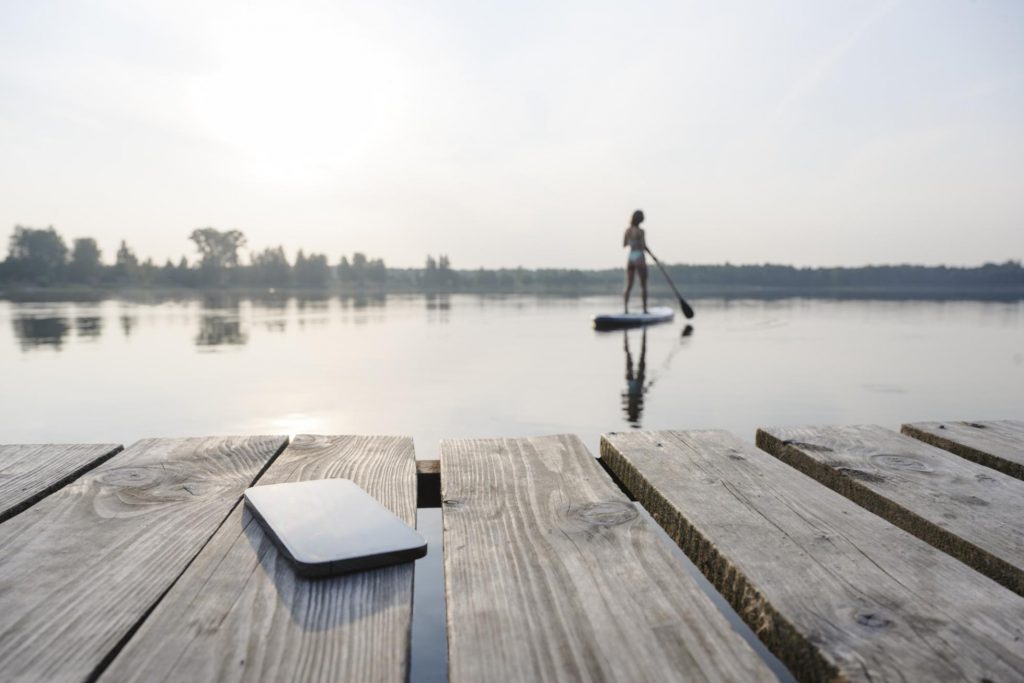“As a psychologist, I see firsthand the toll that constant connectivity takes on mental well-being,” says Dr. Karim J. Torres Sanchez, Clinical Psychologist at LBee Health. “I know how essential it is to truly disconnect and recharge. Unplugging isn’t just a luxury; it’s a necessity for maintaining a healthy mind and a happy family.”
Sanchez notes that the human brain is not designed for multitasking. Instead, we have a finite amount of cognitive resources, including attention, working memory, and executive function. When we try to multitask, we’re essentially dividing these limited resources among several tasks. This leads to a decrease in performance on each individual task. Meaning we don’t do any one task well.
If you’re on vacation and need to also think about work, the act of switching between tasks means your brain can’t do either task well. So whether you’re sending work emails or playing a game with your child at the hotel, your split attention makes it more likely that you’ll make mistakes and not be present for either situation.
Plus, Sanchez adds, the constant effort of switching between tasks is mentally exhausting. “It requires more energy than sustained focus on a single task,” says Sanchez. So doing work while on vacation leads to burnout and a feeling of being overwhelmed. “In short, multitasking is a myth. The reality is that task switching is inefficient, error-prone, and mentally taxing. To be more effective and less stressed, the best approach is to practice monotasking—focusing on one thing at a time until it’s complete,” says Sanchez.
The key to not multitasking is to create a clear separation between your everyday life and your vacation. This is especially true for those of us who tend to be on all the time, whether it’s for our job, partners or our children.
Before You Go Vacation
Sanchez suggests a few simple tips to follow before you head out on vacation.
- The “Out of Office” is Non-Negotiable: Set a professional and polite out-of-office message that clearly states when you will be returning and who to contact for urgent matters. Then, don’t check your email or voicemail.
- Delegate, Delegate, Delegate: A week or two before your trip, identify key tasks that need to be handled while you’re away. Train a colleague or assistant to manage them.
- Tell Your Network: Inform your colleagues, clients, and even close friends that you will be completely off the grid. This sets clear expectations and reduces the temptation to check in.
During Your Trip
While on your vacation, Sanchez suggests these tips.
- Designated Device Times: “I allow my boys a set amount of screen time, usually in the morning or before bed. I use a similar approach for myself on vacation,” says Sanchez. “But I set a strict device-free period, like during dinner or while we are exploring a new city.”
- Turn Off Notifications: The little pings and banners are designed to pull you back in. Turn off all non-essential notifications for email, social media, and news apps.
- One Device at a Time: If you must use a device for a specific purpose, use it for that purpose and then put it away. For example, if you need to check a map, open the map app, find your route, and then turn off the screen. Don’t let a quick map check turn into a 30-minute scroll through Instagram.
Why Unplugging is Important
“Unplugging is more than just taking a break, it’s an act of self-care,” says Sanchez. There are several benefits to staying present on vacation.
- It Recharges Your Brain: Our brains need downtime to process information and form new memories. Constant stimulation from devices leads to mental fatigue and “decision fatigue.” Unplugging allows your mind to rest and reset.
- It Fosters Deeper Connections: Unplugging allows you to fully engage with your travel companions—your spouse, your children, your friends. It creates space for spontaneous conversations and shared experiences.
- It Boosts Creativity and Problem-Solving: When you’re not constantly consuming information, your mind has a chance to wander. This “mind-wandering” is a key component of creative thinking and can lead to new insights and solutions to problems you’ve been grappling with. “Believe me, creativity and laughter are the key to a happier life,” says Sanchez. “When we are more creative, we are happier.”
- It Reduces Stress and Anxiety: The constant pressure to be available, to respond immediately, and to keep up with the highlight reel of social media is a major source of stress. Unplugging breaks this cycle and allows you to enjoy the moment without comparison or judgment.

